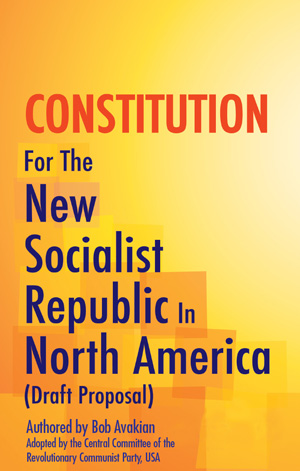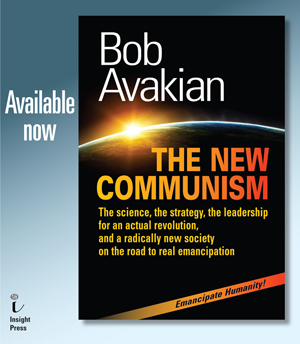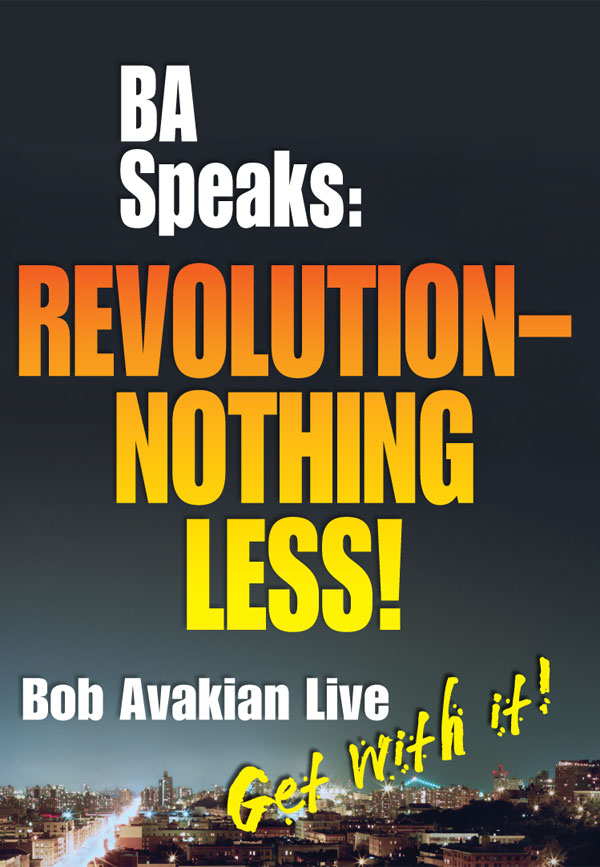How Socialist State Power Would Handle the Louisiana Flood:
Confronting Disaster in the Struggle for a Communist World
September 12, 2016 | Revolution Newspaper | revcom.us
A few questions to think about ...
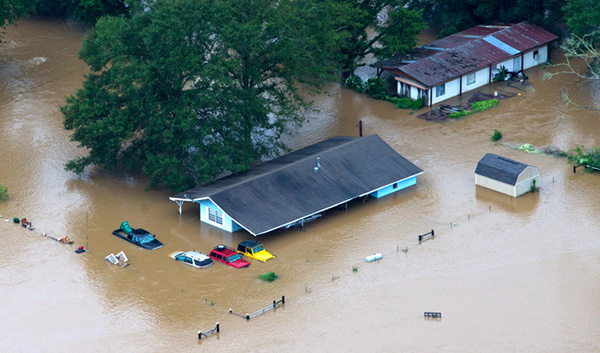
People being rescued from flooded homes along the Tangipahoa River near Amite, Louisiana, August 13. (Photo: Ted Jackson/NOLA.com The Times-Picayune via AP)
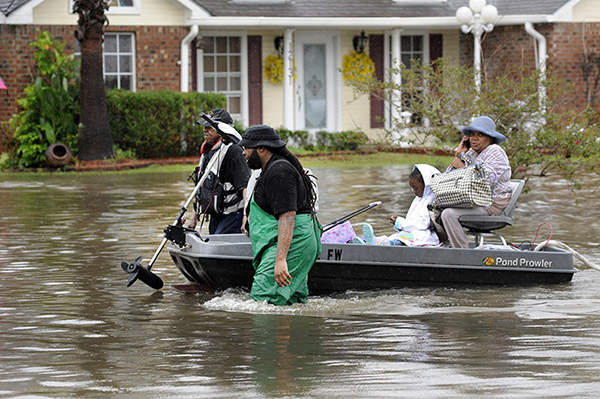
Volunteers pull a boat with a woman and young child as people evacuate their homes, Baton Rouge, August 13. (Photo: John Oubre/The Advocate via AP)
An urban area endures massive flooding that destroys over 100,000 homes. Legions of youth are unemployed, many of them eager for work. Yet those youths aren’t mobilized to put their energy and creativity into rebuilding the city. Why?
A month later, debris and stinking, rotting garbage remain in piles six feet high on countless streets in 100-degree heat. White property owners arm themselves against and threaten to shoot on sight (largely non-existent) “looters” supposedly bent on stealing their destroyed property, because the loss of this garbage will impact their claims on insurance companies. And everyone knows that when they say “looters” they mean Black youths who “don’t fit in”.
Why should anyone accept this?
Waters engulf a region routinely soaked with heavy rains; urban and agricultural areas prone to flooding; a region filled with bayous, swamps, and rivers, bordered by one of the world’s largest rivers that has repeatedly flooded. In response, a patchwork, haphazard series of dams, levees, retention ponds, canals, and other measures provide an (often false) sense of security in some locales, but worsen the overall disaster by diverting it to other, nearby sites.
Why isn’t there a systematic, centralized plan to deal with this situation in a way that preserves and protects human life and the delicate ecosystems in the region?
An area that has been the scene of centuries of brutal oppression of Black people—enslavement and harsh labor on cotton plantations; 100 years of viciously enforced degradation and brutality called Jim Crow; decades of mass incarceration and police brutality, is devastated by a natural disaster. Once again, Black people, and areas where Black people live, are the most severely impacted. The response of the system’s political leadership? "That’s just the way it goes."
But why is that the “way it goes”? What can be done to change that?
The Rain and the Flood
In mid July floodwaters engulfed Baton Rouge, the capital of Louisiana, and large rural and semi-rural areas around the city. At least 13 people were killed. Over 110,000 people have had to apply for housing assistance. As of September 1, the Baton Rouge Advocate reported that exactly one Federal Emergency Management Agency (FEMA) trailer was in place to provide temporary housing.
Revolution recently wrote about some of the stories behind this flood—the heroism of many oppressed people, the crimes of this system and its police, the big questions of climate change, capitalism, and the future that this flood put before society—and the revolution that can solve this. (See “The Louisiana Flood: A Natural Disaster, a Disastrous System“).
“God brought the rain, man made the flood”. Numerous people in Baton Rouge have told us this or something similar. People are saying the rain was a natural phenomenon; the flood was caused by conscious decisions and actions taken by authorities. It’s true that heavy summertime rain in southern Louisiana is not exactly news. It’s also true that conscious decisions taken by political leaders worsened the catastrophe faced by many people.
But we need to dig deeper to get at the real causes of the massive flooding. Must severe natural events always have such devastating impact? How has the social order and structure imposed by capitalism-imperialism shaped the ways in which floods and other contingencies are prepared for (or not prepared for) and confronted? How are people mobilized to deal with such a large scale, life threatening event when it occurs; what is considered important to protect, what values and goals drive and organize how people move through such a situation?
A System that Blocks Human Potential
All societies are organized in certain ways. As Bob Avakian wrote in Making Revolution and Emancipating Humanity, the most basic and essential of all human activity is “the production and reproduction of the material requirements of life.” BA continues that people don’t do this any old way, but by becoming part of a definite set of “relations of production.” This means how individual people fit into the division of labor that exists in all of society—whether they work with their hands and backs or in mental work; picking tomatoes or stocking shelves at Walmart; even whether they can find work at all. It means how much of the products they receive in return for their work. And most of all it means whether or not they own the factories, mines, farmland, ships, etc.—the means of production. And on this foundation a network of legal and political institutions, and ideas that correspond to those institutions, arises, and reinforces the existing relations of production.
In the system of capitalism-imperialism, millions of people in this country and literally billions worldwide engage in production that is tightly bound together, whether any of those particular individuals know it or not. This is socialized production—production that takes place most fundamentally not on the basis of individuals working alone (to make cars, grow foods, sew clothes, or produce anything else), but of countless particular people engaged in the worldwide processes of producing, mining, harvesting, packaging, shipping, and distributing the material goods of life.
But ownership of that production is not in the hands of those who labor to produce it. It is appropriated by a relative handful of people—the capitalists—who use it to amass their own obscene amounts of wealth, but even more to keep the entire process of exploitation going. This bedrock relation of capitalism runs through, influences, and shapes all the relations of capitalist society. It sets the limits and forms for how people think and view the world, and their own place in it. This process, or contradiction, of socialized production and private appropriation (ownership) results in the bitter impoverishment of billions of people worldwide, and the enrichment of a few.
Indications of what this means down on the ground are everywhere in Baton Rouge. The Mississippi river is filled 24-7-365 with tankers, cargo ships and barges carrying industrial and agricultural products to and from all parts of the world. ExxonMobil’s oil refinery is one of the world’s largest, and sprawls over an enormous area along the river in North Baton Rouge, sending toxins into the air, land, and water. Baton Rouge and the surrounding area is one of the poorest places in the U.S., and Louisiana has the highest rate of incarceration in the world, overwhelmingly because young Black men are incarcerated at a staggering pace.
One key expression of socialized production and private appropriation is that in capitalist societies, there is no conscious social planning to meet human need, to prepare and mobilize for emergencies, or to protect vital and diverse ecosystems. This is not an oversight. It is not mainly because of capitalist heartlessness—though there is plenty of that to go around.
Many people are eager and willing to join together and act to help as many people as possible in a crisis like the Louisiana flooding. But the potential for that is held in check, channeled, and ultimately squashed by this system. As one man in Baton Rouge said to us, when the floods hit it was “everyone for himself, and God for us all”. It is still “everyone for him (and her) self” in the aftermath of the deluge.
While there is no god—whether “for us all” or not—there IS the system of capitalism running things, which is not for anyone besides its own continued functioning and expansion. At times of crisis (and in general) the big focus of the system’s rulers is to maintain control, to keep people in place, to keep them passive, relying on the authorities and perhaps charity. They do NOT want people acting together with others independent of the authorities, raising their heads, asking questions, and forging unity. So in North Baton Rouge and other largely Black areas, no official rescue teams were seen for several crucial days when flood waters surged up to six feet deep. When they did appear it was to impose a curfew and prowl the streets of the oppressed.
A New State, Setting New Terms for Society
Things would be radically, completely different in the state made possible by revolution and envisioned in the Constitution for the New Socialist Republic in North America.(CNSRNA).This new state would have come into existence after the victory of an actual revolution: after the complete defeat and dismantling of the currently existing capitalist-imperialist state, in particular its armed forces of repression and the institutions that back them up: the military, the police, the national guard, the courts, the prisons and the penal system. An entirely new power would be in place, setting new terms for all of society and all the individuals in it.
This is possible because this state would be built on a foundation of public-state, not private ownership. Socialized production would be, increasingly, socially owned until, through continued revolutionization of society worldwide, communism is attained and the whole concept of “ownership” will become obsolete. That process of revolutionary transformation would open up entirely new vistas of possibilities for humanity.
A crisis such as the Louisiana flooding would be a big jolt in the new socialist society. Would the new society confront this crisis in a way that meets its urgency and doesn’t take days to take shape, but also serves the advancement of the world revolution and the overall revolutionary transformation of society?
Meeting people’s needs in the new society means not only “doing things differently” but challenging, and transforming, how people think. As Bob Avakian wrote in his essay “Three Alternative Worlds”, “How can the masses of people really take up the task of consciously changing the world if their outlook and their approach to the world remains what it is under this system? It’s impossible, and this situation will simply reproduce the great inequalities in every sphere of society ...”
Raising the Bottom Up
A basic principle of the CNSRNA and its approach to the economy is to take special measures to “raise the bottom up.” The CNSRNA states that “This principle serves the crucial task of overcoming historic inequalities affecting the formerly oppressed nationalities, and other profound disparities in society. The whole of society will be mobilized to overcome these inequalities. Priorities in distribution of needed social goods and services (like health and housing) will be guided by this principle.”
If anyone thinks this process will be smooth sailing in the aftermath of something like the flood in Baton Rouge, they are in for a rude awakening. There is a whole history and reality to the oppression of Black people in this country. As BAsics 1:1 states, “There would be no United States as we now know it today without slavery. That is a simple and basic truth.”
This oppressive legacy has left material and ideological scars, and they are as deep in Louisiana as anywhere in the country. Years of whiplashed enslavement along the “river of dark dreams”; a century of viciously enforced “second class citizenship” and “no rights that a white man is bound to respect” Jim Crow, with all the lynching and brutality that enforced it; institutional segregation and discrimination down to today that is barely distinguishable from the era of the 1950’s. And an odious, hateful outlook—virulent racism—that has reinforced, justified, and perpetuated all this.
Raising the “bottom up” and working to overcome the historic inequalities left over from centuries of oppression of Black people will be official policy and not be “up for grabs”. But this will be sharply contested and contended.
The stakes will be very high. Struggles over questions like how to confront the sudden trauma of major flooding can lead to great leaps and advances in further overcoming the old, bourgeois economic and political relations and ways of thinking, and advancing on the revolutionary road. They can also lead to stagnation, even setbacks in the fight to revolutionize society and advance the world revolution, and strengthen the basis for capitalism to re-emerge.
There will be differing assessments of the situation, differing solutions offered—a diversity of political outlooks, programs and tendencies which reflect and express economic and social relations of the old society. One very sharp question would likely be—why should the policy of “bottom up” be applied when other areas also suffered extreme damage? What would it mean to apply that policy in the first place? Does this mean simply giving Black people “preferential treatment” like so-called “affirmative action” claims to do in capitalist society, or is it aimed at actually uprooting the legacy of oppression?
All this would be in the context of a revolutionary society and a socialist state that, while giving due emphasis to meeting the needs of the people and continuing to uproot remaining inequalities, gives fundamental priority to advancing the revolutionary struggle, and the final goal of communism, throughout the world. In that light, how would the goal of advancing the world revolution be met concretely in circumstances like a major flood? Wouldn’t many people argue along lines similar to an argument often heard today: “How can we help people around the world if we can’t get our own situation straightened out?”
Optimizing Resources
Another big question would center around how to optimize society’s resources. There are never unlimited resources. There is never an ability to do “whatever you want”. Everything couldn’t be rebuilt at once. The question of whether some places and things should be rebuilt or restored would almost certainly be sharply contended. Understanding all this is part of understanding the terms that objective conditions will set on socialist society, even as the conscious forces continually struggle to lead in transforming those conditions.
In a socialist society, preparations would be made in advance to minimize, in a planned and societal way, the potential impact of flooding and other foreseeable natural crises in different areas of the country. Steps would be taken that prepared for emergency responses to mobilize masses of people to ensure that the most basic needs of life were met—food, shelter, water, medical supplies and support. More than that, overall efforts would be made to minimize the long term possibility of potential flooding in southern Louisiana and the entire area up and down the Mississippi river.
This effort would consciously aim at implementing and concretely developing all three of the criteria cited above in the CNSRNA (see sidebar). It would draw on the knowledge, insight, and experiences of scientists and engineers, along with people from the affected areas. Housing that could withstand foreseeable potential crises would be systematically constructed. All this would be thrashed out through struggle, based on the overall guidelines of the three criteria. None of this is possible under capitalism. But it could, and would, be underway in a planned way, very quickly in the new society.
This intersects with the problem of the enormous destruction of the environment capitalism-imperialism has caused. Already, sections of the earth have been made uninhabitable. The likelihood of extreme weather conditions is intensifying. Hard decisions will have to be made about whether some areas can be saved for human habitation. Often these are areas—like South Louisiana—that are home to large numbers of oppressed people. This will be debated out very broadly, on the basis of the broad principles and guidelines we’ve already talked about.
A Moving Target
The orientation of “solid core with a lot of elasticity” will be at the heart of how communists approach all challenges in the new socialist society. It will also be part of the cohering political glue of society.
Concerning the orientation and objectives of the new society, the CNSRNA states that “the principle of ‘solid core, with a lot of elasticity’ must be applied. This means that, on the one hand, there must be a continually expanding force in society, with the revolutionary communist party as its leading element, which is firmly convinced of the need to advance to communism and deeply committed to carrying forward this struggle, through all the difficulties and obstacles; and, on the basis of and at the same time as continually strengthening this ‘solid core,’ there must be provision and scope for a wide diversity of thinking and activity, among people throughout society, ‘going off in many directions,’ grappling and experimenting with many diverse ideas and programs and fields of endeavor—and once again all this must be ‘embraced’ by the vanguard party and the ‘solid core’ in an overall sense and enabled to contribute, through many divergent paths to the advance toward the goal of communism.”
BA’s breakthrough understanding of “solid core with a lot of elasticity” is a central part of the advance in epistemology that runs through all dimensions of his New Synthesis. It is not just a theoretical abstraction, a “good idea”. It is in fact a very good idea—and more to the point it is profoundly, scientifically moored in material reality in all its wild conflict and turbulence. It scientifically reflects and concentrates the actual material relations of all of society, a reality communists are seeking to transform.
Advancing through any natural disaster or social crisis would not be simple or easy in a socialist society. But without a scientific understanding grounded in Bob Avakian’s new synthesis of communism and leadership firmly proceeding from that, there is no way anything positive for humanity’s emancipation can come out of it.
So, think again about those questions at the beginning of this article. Things don’t have to be that way. Another world is not only necessary—another world is possible. We need revolution as soon as possible to get to that world.
Volunteers Needed... for revcom.us and Revolution
If you like this article, subscribe, donate to and sustain Revolution newspaper.

